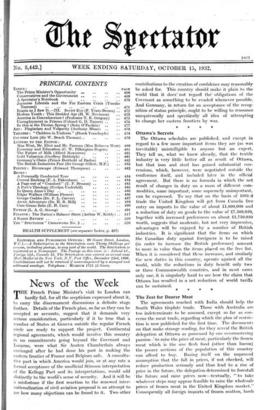Ottawa's Secrets The Ottawa schedules are published, and except in
regard to a few more important items they are (as was inevitable) unintelligible to anyone but an expert. They tell us, what we knew already, that the textile industry is very little better off as result of Ottawa, but that iron and steel has gained substantial con- cessions, which, however, were negotiated outside the conference itself, and included later in the official agreement. But there is no formula in which the net result of changes in duty on a mass of different com- modities, some important, some supremely unimportant, can be expressed. To say that on the basis of 1931-2 trade the United Kingdom will get from Canada free entry on imports to the value of about £1,600,000 and a reduction of duty on goods to the value of £7,500,0*, together with increased preferences on about 11,750,000 worth, suggests that moderate, but not very impressive, advantages will be enjoyed by a number of British industries. It is significant that the items on which the Canadian duty .against foreigners is to be raised (in order to increase the British preference) amount to more in value than the items placed on the free list. When it is considered that these increases, and similarly the new duties in this country, operate against all the world, while the reductions in duty benefit only two or three Commonwealth countries, and in most oases only one, it is singularly hard to see how the claim that Ottawa has resulted in a net reduction of world tariffs can be sustained.


























































